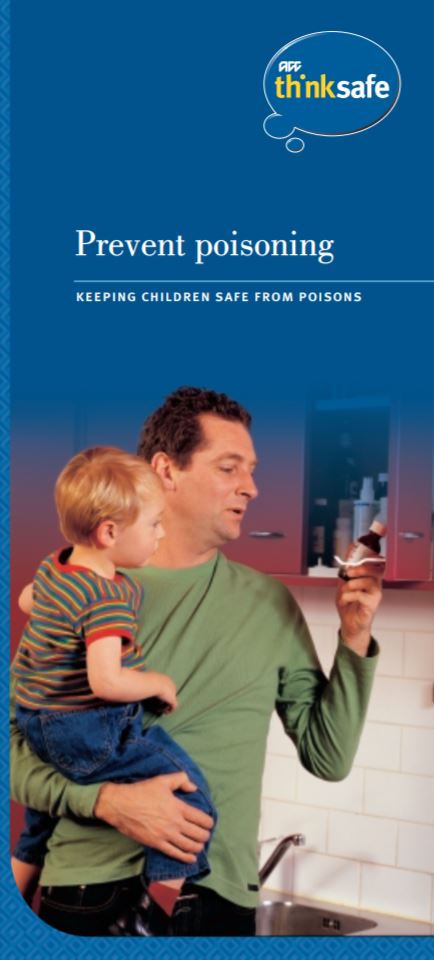If you think a child or someone else has suffered from poisoning or taken a medicine that is not for them, call the National Poisons Centre(external link) on 0800 764 766 for advice, or call 111 for an ambulance. They will tell you what to do. If you have to go to hospital, take the medicine or chemical and the container with you. This will give the hospital good information about the medicine or chemical and how much has been taken.
Preventing poisoning
Key points about preventing poisoning
- Having medicines and chemicals around your home puts people at risk of accidental poisoning.
- Yet we all need to keep medicines and chemicals in our homes.
- Everyone in the household is at risk, but children and older adults are most at risk.
- What can you do to keep everyone safe?
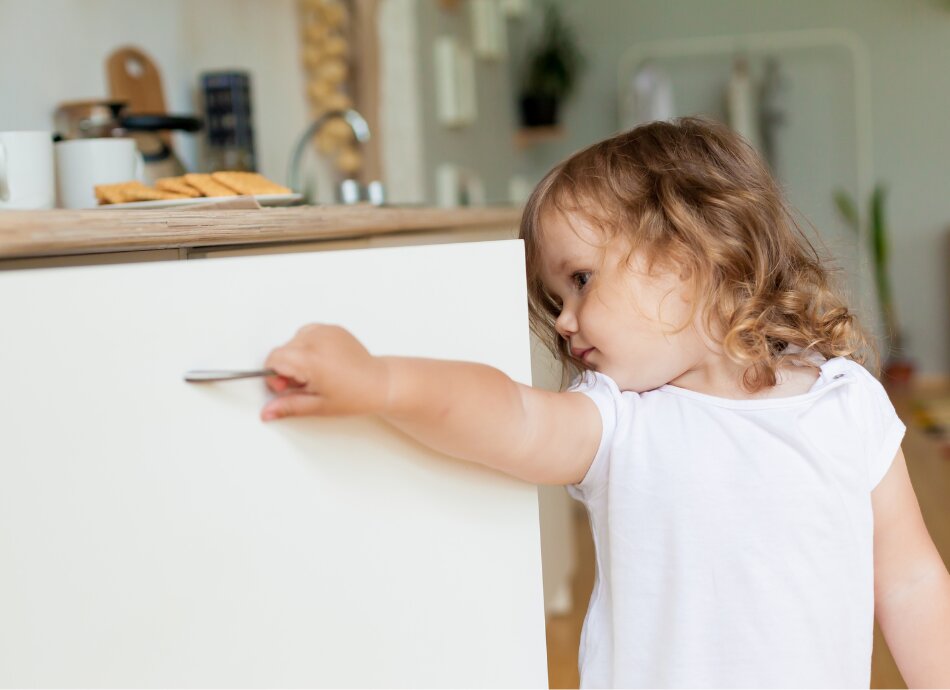
1. Keep all medicines and chemicals out of sight and reach of children
If it's possible, lock away all medicines and chemicals in a storage cupboard. Young children can be good climbers and can stretch out to get something that you thought might be out of their reach.
Keep the dishwasher shut when it's not in use as there could be some leftover dishwasher powder in it. Children can easily get into the dishwasher and eat the powder, which can result in serious poisoning.
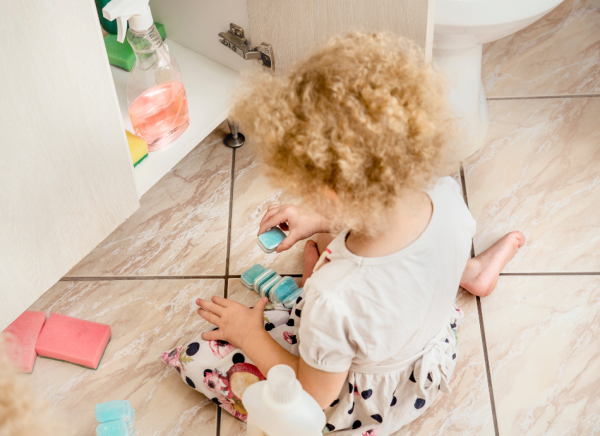
Image credit: Canva
Small batteries can also be easily swallowed, so keep them out of reach of children. Read more about button battery dangers for children.
2. Keep chemicals and medicines in their original containers with labels in place
Keep all chemicals and medicines in their original containers with their original labels. Don't store them in a food or drink container, as you or other people in your household may mistake it as food and eat it. Storing chemical and medicines in food or drink containers is illegal and highly dangerous and can cause serious poisoning.
3. Store all chemicals and medicines separately from food
While keeping chemicals and medicines in their original containers is a good practice, you must also store them separately from food. This reduces the chance of accidental poisoning. It also helps teach children that medicines and chemicals are not food.
4. Put any chemicals or medicines straight back where you keep them after you've used them.
A lot of childhood poisonings happen when chemicals or medicines have been left out after use.
5. Dispose of chemicals and medicines that are no longer used
If you are no longer using any chemicals or medicines, make the effort to get rid of them in an appropriate way to avoid accidental poisoning. You can contact your National Poisons Centre or your regional council for advice on how to dispose of chemicals. Contact your local pharmacy for disposal or return of medicines.
7. Be careful of child-resistant caps
Child-resistant caps are not child proof, so keep medicines out of reach of children even if they have child-resistant packaging.
8. Practice safe medicine use
If you, your children or anyone else in the household need to take any medicines, practicing safe medicine use can help prevent accidental poisoning.
- Before taking your medicines, read and follow the instructions and warnings on the label.
- If you have any questions about the use, side effects or interactions of your medicines, ask your doctor or pharmacist.
- Old and outdated medicines should be disposed of or returned to your local pharmacy.
- Don't share your prescription medicines with someone else.
- Ask your pharmacist about getting your medicines in a blister pack or pills tray if you have difficulty remembering when to take your medicines.
- Make sure you have a record of the normal contents of your pillbox, including the name, number of pills and description. This would be helpful if any children manage to access the pillbox.
- Keep all medicines out of reach of children.
- Don't refer to medicines as sweets when encouraging children to take medicines.
- Don't take or give medicines in the dark to avoid taking medicines in an incorrect dose.
Read more about tips for using medicines safely.
9. Keep vaping devices and fluids out of reach of children
Vape liquids/juices are dangerous because they're highly concentrated and contain dangerous chemicals. Also, they're particularly attractive to children because they have a flavoured scent. Swallowing even a small amount (1mL) can be harmful to tamariki. When they're not being used, they should be out of reach and out of sight. If a child has gained access to a vape or vape liquid call 0800 764 766 for first aid advice. If they have had access and you find them unconscious or they're not responding call 111 immediately.
These things are often found around our homes and you may not think to lock them away safely. They vary in how poisonous they are, but can all cause damage if they're eaten.
- Boric acid-based ant baits.
- Dishwasher tablets and powders.
- Bleaches (sodium hypochlorite).
- Essential oils.
- Ethanol – includes alcoholic drinks, window cleaners, methylated spirits, perfumes, mouth washes and hand sanitisers.
- Foaming products – includes dishwashing liquids, hand soaps and bubble blowing mixture.
- Irritants – cosmetic products, barrier creams, glow stick ingredients.
- Nail polish
- Reed diffusers (a jar or bottle of fragrant liquid with wicking reeds).
- Silica gel packets are a choking hazard.
- Superglue
- Vape liquids.
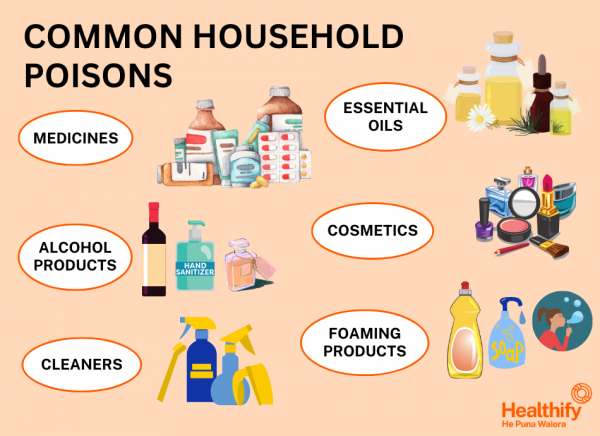
Preventing poisoning in the home(external link) National Poisons Centre, NZ
Poison prevention for the older generation(external link) National Poisons Centre, NZ
Prevent poisoning in the home(external link) Healthy Western Australia
Poisoning prevention(external link) NHS, UK
Brochures
Child-resistant packaging(external link) Ministry of Health, NZ, 2002
Put your kid's safety first(external link) Safekids, NZ
Poisoning prevention and first aid(external link) National Poisons Centre, NZ
Prevent poisoning – keeping children safe from poisons(external link) ACC, NZ
References
- Preventing poisoning in the home(external link) National Poisons Centre, NZ
- Poison prevention for the older generation(external link) National Poisons Centre, NZ
- Poisoning prevention(external link) NHS, UK
- Childhood poisonings – hazardous substances around the home(external link) BPAC, NZ, 2022
- Dangers of vaping devices around the home(external link) National Poisons Centre, NZ
Brochures
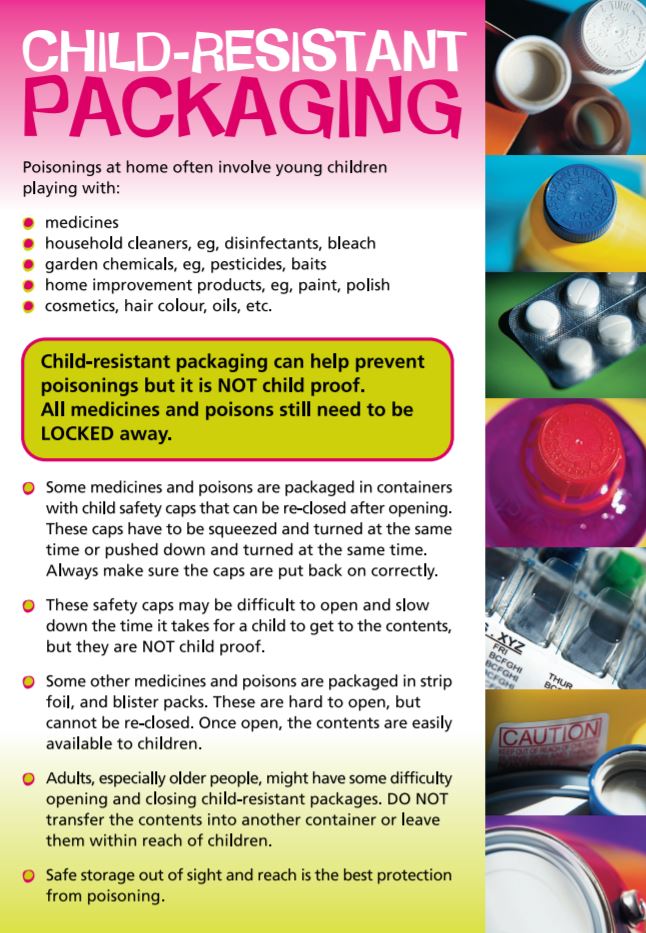
Ministry of Health, NZ, 2002
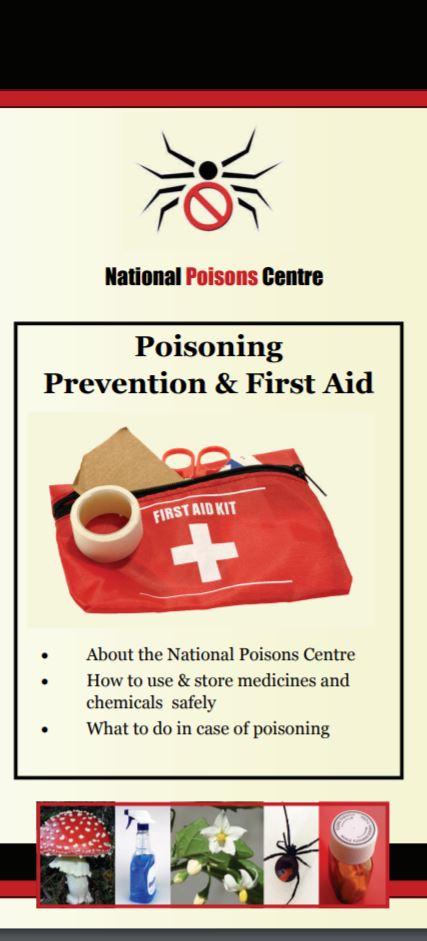
National Poisons Centre, NZ
Credits: Healthify editorial team. Healthify is brought to you by Health Navigator Charitable Trust.
Last reviewed:


